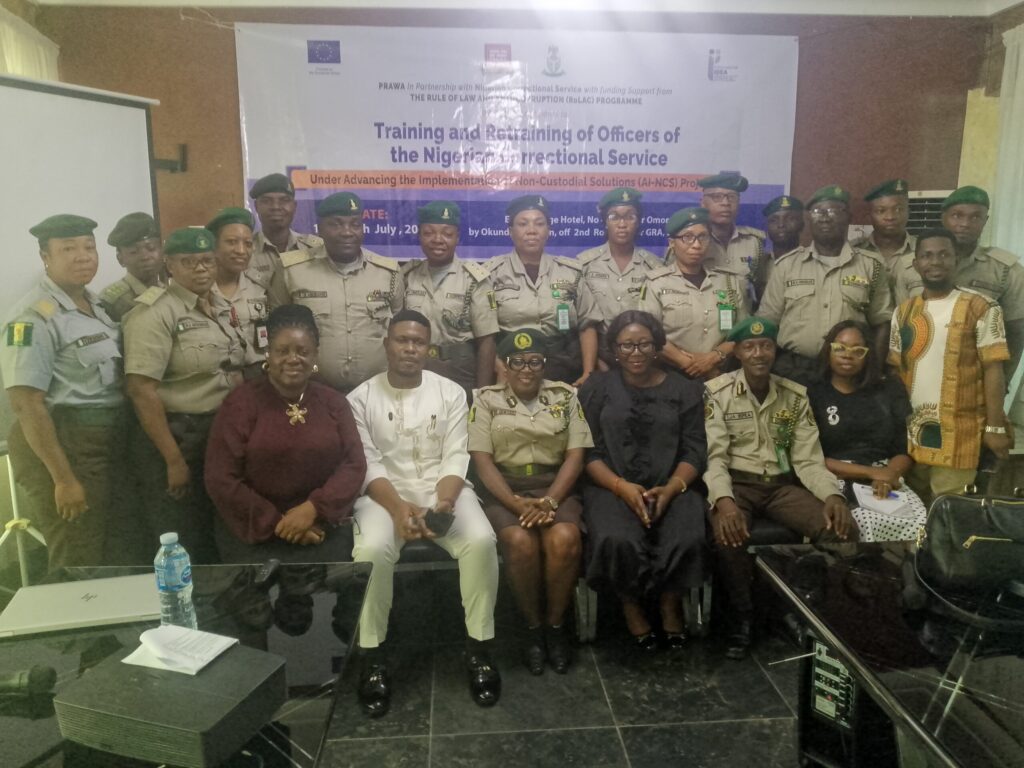From Ighomuaye Lucky, Benin
The Controller General of the Nigerian Correctional Service (NCoS), Sylvester Ndidi Nwakuche, has tasked correctional officers to recommit themselves to a correction service that leads with innovation, compassion, and respect for human rights while discharging their duty as an officer.
He gave the task at a two-day training for Correctional Officers on Advancing the Implementation of Non-Custodial Measures organized by Prisons Rehabilitation and Welfare Action (PRAWA), funded by the Rule of Law and Anti-Corruption (RoLAC), held in Benin.
The Controller General of the Nigerian Correctional Service, represented by the Deputy Controller General, Controller on Duty, Vera Elizabeth Ogwude, said Non-Custodial measures are central to the modern correctional paradigm.
CG Nwakuche said that by diverting appropriate cases from traditional imprisonment, they have reduced overcrowding, lower costs and tackle the root causes of criminal behaviour through restorative justice, probation, community service and counseling.
Nwakuche added that these alternatives, strengthen families, rebuild trust and empower offenders to lead law-abiding lives.
He urged them further to leverage on the training to deepen their understanding of assessment tools, supervision techniques, and inter-agency collaboration adding that, the training is not just an academic exercise but a transformative process.
He maintained that with all measures taking, together, they will all make the Non-Custodial measures a cornerstone for public safety, social harmony and restorative justice in our nation.
For the Edo State Administration of Criminal Justice Monitoring Committee, represented by its Secretary, Esosa Osula, she appealed to the judges in the various courts to encourage the Non-Custodial measures in dealing with cases in their respective courts to address the issues of overcrowding in the nation’s correctional centres.
She said besides the tackling of overcrowding in our nation’s correctional centres, it will also help in cutting down cost of running them.
Speaking also, the Programme Officer, Rule of Law and Anti-Corruption (RoLAC), Imonitie Omokhodion, called for a synergy between the relevance stakeholders so that the issues confronting the Non-Custodial measures would be handled in the overall interest of all.
On the essence of the two days training for the correctional officers
in the state, President, Prisons Rehabilitation and Welfare Action (PRAWA), Uju Agomoh, said it was targeted at improving the effectiveness of the Nigerian correctional officers overseeing the non-custodial sentences.
She said they will also learn how to interact with the judiciary (magistrates and judges), families (including victims’ families), the community, faith-based organizations, and other support groups involved in offender rehabilitation and community integration.
One of the participants, a Deputy Superintendent of Corrections in the Nigerian Correctional Service, Omoregie Efosa said the training will improve on his previous knowledge of Non-Custodial sentencing, specifically in the areas of community service, probation, restorative justice as well as any other sentences a judge might pronounce.
He said it will improve his performance in supervising the sentences passed on offenders using Non-Custodial measures.


